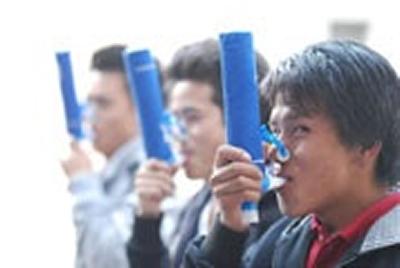Southampton scientists climb to Everest Base Camp to further hypoxia research

Scientists and medical staff from Southampton are taking on one of the harshest environments known to man to further vital research into the effects of low oxygen levels on the human body.
One in five people in the UK will end up in intensive care at some point in their life and of those, 40 per cent will die. Despite intensive care being one of the most sophisticated areas of hospital care, there is still limited understanding of why some people survive and some die.
Hypoxia (lack of oxygen reaching the body's vital organs) takes place at high altitudes but is also a common problem for patients in an intensive care unit.
Mike Grocott, who also leads the Critical Care Research Area within the Southampton National Institute for Health Research (NIHR) Respiratory Biomedical Research Unit and is Professor of Anaesthesia and Critical Care at the University of Southampton, is joined on the Xtreme Everest project by Dr Denny Levett; research nurses Kay Mitchell and Karen Linford; Clinical Scientist Dr Sandy Jack and medical student Tom Smedley, all from University Hospital Southampton NHS Foundation Trust.
Xtreme Everest is a dedicated team of doctors, nurses and scientists who are conducting investigations of human adaptation to hypoxia at high altitude, with the hope of developing novel treatments for critically ill patients suffering a similar challenge in hospital. The project is an international collaboration between the University of Southampton, University College London (London, UK) and Duke University (North Carolina, USA).

The team have travelled to Mount Everest, the world’s highest mountain, to conduct experiments on themselves and a group of volunteers at high altitude. The trip, which will run until May, is an extension of the work the team did on Everest in 2007.
Mike Grocott, who is also a consultant in critical care at Southampton General Hospital, comments: “The oxygen levels on the summit are a third of those at sea level - similar to those experienced by patients in intensive care, which is why this type of environment offers us an excellent opportunity to conduct vital research. Our expedition in 2007 broke new ground and provided a lot of information but questions remain.
“We will be exposing ourselves and those volunteering to very low levels of oxygen and analysing how we respond, so we can see how we can adapt our intensive care setting at home. We hope that we will be able to reduce the number of deaths in intensive care.”
Volunteers joining the Xtreme Everest scientists will include identical twins, children, Sherpas, and some of the volunteers who took part in the 2007 expedition.
The researchers will be looking at the precise mechanisms that enable Sherpas to live at such high altitudes, children’s responses will be compared to adults and assessments will be done to establish the influence of epigenetics on acclimatisation.
Later this year the team will be testing a drug compound they previously studied on an expedition to the Alps in 2010. The compound may make lowland patients more 'Sherpa-like.' Initial results from the Alps showed that the compound can mimic the blood chemistry of Sherpas. Now, the team aim to see if these same changes can be demonstrated in hypoxic patients and if this results in clinical benefit.
Professor Grocott adds: “This is a unique collaborative research programme involving a lot of people, many of them volunteers. But extreme illnesses require cutting edge research to provide solutions and we hope that we will be able to provide some of those solutions.”